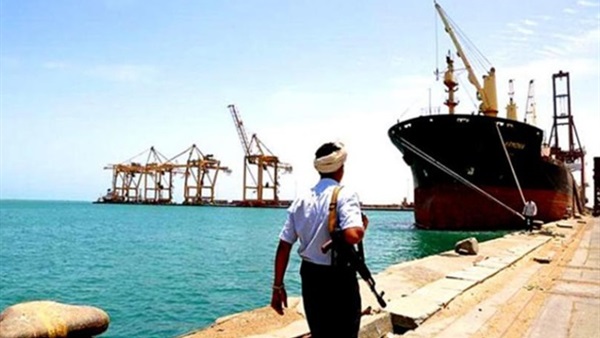Yemeni government moves internally and externally to confront Houthi threats to navigation and oil ports

The terrorist Houthi militia continues its attacks on Yemeni oil facilities in an open attempt to blackmail the legitimate government and the international community with the aim of obtaining new gains in addition to those achieved during the last six-month truce.
Since mid-October 2022, the port of Al-Dabba in Hadramout was subjected to three Houthi attacks, while three other attacks affected the ports of Rudum and Qena in neighboring Shabwa.
The Houthi militia claimed responsibility for the terrorist attacks that targeted oil ports and vowed that they would continue to attack oil ports, installations and ships.
Long-term policy
For its part, the Yemeni government is moving to face these threats, externally and internally, within the framework of the long-term policy practiced by the government to confront the terrorism of the Houthi militia.
On Sunday, November 27, Yemeni Foreign Minister Ahmed bin Mubarak discussed the Houthi threat to international navigation with US Ambassador to Yemen Steven Fagin.
According to the official Yemeni news agency, Saba, the two sides discussed the difficulties impeding the peace process in Yemen after the escalation of terrorist militias and their threat to international navigation, international security and peace, and the dangers of those militias' recent adoption of the so-called “functional code of conduct” that aims to ideologize society and impose a class identity instead of a national identity.
The US ambassador renewed his strong condemnation of the Houthi terrorist attacks on oil facilities, stressing his country's support for the security, stability and unity of Yemen, while Bin Mubarak stressed that the Yemeni government is continuing the procedures for implementing the decision to classify the Houthi militia as a terrorist organization, pointing to the importance of the international community's support for those decisions in a way that contributes to curbing the Houthi militia’s approach of violence and terrorism.
For its part, the Yemeni Presidential Leadership Council warned of the Houthi attacks on oil installations, which threaten the stability of the region, energy supplies and freedom of trade.
During its meeting chaired by Rashad al-Alimi, the council revealed that the wreckage of drones used in recent criminal attacks proves the Iranian regime's involvement in supporting these “cowardly sabotage” acts.
The Presidential Leadership Council stressed the need for the international community to realize the seriousness of the continuation of such threats, as well as Iran's role in providing its terrorist militias with ballistic missile technologies and drones, of which huge shipments were intercepted during the past few weeks.
It pointed out that the grave effects that will result from these terrorist attacks, foremost of which are the salary and food security crisis across Yemen, threatens to have catastrophic repercussions and the collapse of all efforts made to avert the specter of famine.
The Presidential Leadership Council called on “the international community to assume its responsibilities in the face of this dangerous terrorist threat that the Houthi militia and its supporters boast of in a war crime that requires firm punishment by designating it as an international terrorist group.”
Yemeni government plans
The Yemeni government has approved plans submitted by a number of ministries in the military, security and intelligence aspects to confront the Houthi escalation.
During the Yemeni Cabinet's deliberations, in an extraordinary meeting in the interim capital, Aden, on Wednesday, November 23, the Yemeni Cabinet considered the Houthi militia's attacks on oil ports and facilities a declaration of open war by the militia and its supporters in Tehran.
“The Council approved, based on the plans submitted by the relevant ministries, a number of decisions in the military, security and intelligence aspects to confront the dangerous Houthi terrorist escalation on the way to completing the restoration of the state, ending the coup, and protecting the interests of the Yemenis,” a statement from the Council read.
It emphasized coordination with Yemen's partners in combating terrorism and the international community, particularly the brothers in the Coalition to Support Legitimacy led by Saudi Arabia and the UAE, to implement these decisions within a comprehensive and integrated framework to achieve popular will and binding international decisions.
It also stressed that the Yemeni government, under the directives of the Presidential Leadership Council, will not tolerate the Houthi terrorist attacks, which disrupt the activities of economic facilities with the aim of harming the lives of millions of Yemenis who have been subjected to the most heinous violations by this criminal militia.
The statement pointed out that the terrorist Houthi militia is writing its end by insisting on starving Yemenis and destroying their economy and national capabilities.
It noted that the Houthi militia attacks did not stop affecting the national economic institutions and the lives and livelihood of Yemenis, but rather affected peace efforts, the security and stability of the region, energy supplies, freedom of international navigation, and global trade.
The statement criticized the international community's continued silence over the Iranian regime's supply of weapons and money to the Houthi militia, which contributed - in addition to being a blatant interference in internal Yemeni affairs - to prolonging the crisis, claiming the lives of thousands of Yemenis, and endangering regional and international security.







